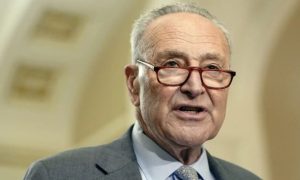The 2024 presidential election is top of mind and, if you are a shareholder in a company, you might be paying more attention to Donald Trump’s campaign in the upcoming months. Not only will you cast your vote for the next president of the United States of America, you will shape the landscape of corporate income tax.
Also Read– Trump Wants To Eliminate Income Taxes: How Would That Impact You If You Are Retired?
That’s because while you as a shareholder could bear most of the burden when it comes to income tax, you are not alone.
As the Tax Policy Center stated: “Over time, others bear some of the burden because of a chain reaction that begins with the shareholders. The corporate income tax reduces shareholders’ after-tax returns, causing them to shift some of their investments out of the corporate sector.”
The TPC goes on to explain how shareholders can “shift some investments to unincorporated (‘pass-through’) businesses and some to foreign investments not subject to the U.S. corporate income tax. The shift to these other sectors raises the price of the associated assets until the after-tax return (adjusted for risk) on investments in these sectors is about the same as in the U.S. corporate sector.”
Therefore, across all sectors, the corporate income tax lessens returns on investments. That’s because moving investments overseas brings down the amount of capital equipment, property and the like that is typically tied to the U.S. workforce. Therefore, productivity drops, as do wages and compensation, the TPC said.
So what does this mean if Trump retakes the Oval Office this November? Several economists and money experts gave their takes to GOBankingRates.
Also Read– How Much Can You Deposit in a Checking Account?
Lower Corporate Taxes
In 2017, the Tax Cuts and Jobs Act (TCJA) passed by President Trump brought the corporate income tax rate down to 21% from 35%, according to Chuck Warren, host of the economic podcast “Breaking Battlegrounds.”
“A reelection may entail further reductions or at least a continuation of present rates,” Warren explained. “By doing so, this decrease enables post-tax profits for businesses, thus increasing their investment propensity potentially leading to economic growth.”
Isabella Brown, a politician and campaign manager for Qualify Candidates, said, “In case Trump becomes the president for another term, it is possible to have a mechanism for reducing or expanding corporate tax policies. … There could be further reduction in taxes or preservation of the current rates under a Trump administration, creating a conducive business environment.”
Brown, however, cautioned the importance of thinking overall about the economic consequences that could have global impacts when corporate taxes are lower.
Also Read– I’m an Economist: Here’s What a Trump Win in November Would Mean for the Tax Burden on the Poor
Tax Incentives
“Trump has urged for tax incentives that will enable businesses to stimulate economic activity,” Warren said. “This may consist of stimuli for repatriating offshore profits and making investments in infrastructure or research and development purposes. These can lower a corporation’s overall tax burden and encourage domestic capital accumulation.”
Benson Varghese, the founder and managing partner of Varghese Summersett, said, “Since turbocharging business investment was a focal point of [Trump’s] presidency, I imagine taxes would remain relatively low for S-corps, LLCs and other ‘pass-through’ entities.”
Also Read- Trump’s Supreme Court appointees have again sided with liberals
Deregulation
“Though not a direct issue to do with taxes, the deregulation policy pursued by Trump is intended to reduce corporations’ compliance costs and hence their financial burdens,” Warren said.
However, without control of Congress, Varghese said, “Trump may have trouble passing even more cuts as Democrats will decry any lost revenue. The tax burden could also rise again in later years as annual deficits continue ballooning. But for the immediate future, CFOs may be able to breathe a small sigh of relief if they see four more years of the same administration.”
Warren said, “Such an approach may result in a more business-friendly environment, thus potentially enhancing corporate profitability as well as international competitiveness.”
Fiscal Deficit and Long-Term Impact
If not offset by spending reductions or other sources of income, reduced corporate taxes could lead to high fiscal deficits, Warren said.
“As such, over time, this can cause higher interest rates or inflation,” he said, “thereby influencing the macroeconomic climate where companies operate.”
Based on historical data, such a tax cut could have significant economic implications, said Abid Salahi, the co-founder of FinlyWealth.
“According to the Bureau of Economic Analysis, the 2017 tax cuts led to a surge in corporate profits, with after-tax profits rising by 16.2% year-over-year in Q2 2018,” Salahi said. “However, it’s crucial to note that the impact on job creation and wage growth was less pronounced than initially projected.
“A potential outcome of further corporate tax cuts could be increased stock buybacks and dividend payments rather than substantial increases in capital expenditures or wage growth,” Salahi added. “Following the 2017 tax cuts, S&P 500 companies announced a record $806 billion in stock buybacks in 2018, a 55% increase from 2017, according to S&P Dow Jones Indices.”
Read More:- Silver’s model predicts win for Trump in 2024 presidential election
Final Thoughts
Brown predicted that a second term of Trump “may also lead to increased national debts and budget deficits that are not balanced by spending cuts or other sources of income. The way such regulations would work out in the long run depends on their balance.”
Warren said a second Trump presidency could create “favorable tax policy environments that facilitate business operations by multinationals while boosting both the value of the dollar against major currencies and reducing fuel prices worldwide, which benefits global travelers. … But the wider impacts on the economics behind these might have to be watched with caution if sustainable growth is desired.”
Brown concluded: “While specific predictions and outcomes would necessitate careful examination by economists, most experts believe that generally speaking, Trump’s government would incline towards relieving corporations of tax burdens to promote business expansion and investment.









































